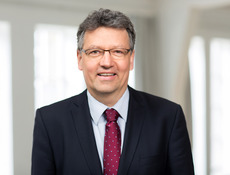
Veit Mette
The labor market will need more immigration from non-EU countries in the future
Germany's population is shrinking and aging. Thousands of new workers will soon be needed. Yet immigration from the EU alone will not be enough to close the gaps in the long term. Stronger immigration from third countries is necessary.
In the coming decades, Germany will be more dependent than ever before on immigration. Without immigrants, the potential labor force would sink from approximately 45 million today to less than 29 million by 2050 – a decline of 36 percent. This gap cannot be closed without immigration. Even if women were to be employed at the same rate as men, and the retirement age was increased to 70 in 2035, the number of potential workers in the country would rise by only about 4.4 million. These are the findings of a new Bertelsmann Stiftung study.
Immigration from EU countries will decline over the long term
In 2013, a total of 429,000 more people came to Germany than left the country. Last year, the net total was 470,000, the Federal Statistical Office reports. According to the study, net immigration at this level would be sufficient for at least the next 10 years to keep the country’s potential labor force at a constant level. From that time onward, however, the need for immigrants will grow, because the baby-boomer generation will be entering retirement. One out of two of today’s skilled workers with professional training will have left the working world by 2030.
The authors of the study, experts from the Institute for Employment Research (IAB) and the Coburg University of Applied Sciences, predict that the current high levels of immigration from EU countries (2013: around 300,000) will soon decline significantly, as demographic change is shrinking populations across the European Union, and because incentives to emigrate in crisis-stricken countries will decline with economic recovery. The experts forecast an annual average of just 70,000 immigrants or fewer from EU counties by 2050. For this reason, efforts to attract skilled workers from non-EU countries should be intensified.
According to the study's various scenarios, by 2050 Germany will need between 276,000 and 491,000 people per year from non-EU countries. In 2013, there were just 140,000 net immigrants from non-EU countries. Moreover, only 25,000 skilled workers came to the country on the basis of the EU Blue Card or other employment-related residence permits.
For a new immigration law
"Germany cannot rely on continued high immigration from within the European Union. We must set a course now that makes Germany more attractive as a destination country for third-country nationals as well."
Jörg Dräger, Member of the Executive Board of Bertelsmann Stiftung
Jörg Dräger, a member of the Bertelsmann Stiftung's executive board, calls for an easily understood immigration system signaling that immigration among the skilled from outside the European Union is not only allowed, but desired. This welcoming signal should be based on a new immigration law that makes immigration rules transparent and simple, and offers immigrants prospects for a long-term stay and swift naturalization. The migration research shows that countries are more attractive to skilled foreign workers if they offer robust opportunities for participation. This includes language support, integration into the labor market, social equality and protection against discrimination.
The study's authors acknowledge that the actual demand for labor is difficult to forecast given the changing character of working environments, for example through digitization. Nevertheless, given the aging of society, a relatively large potential labor force and thus immigration is necessary in order to ensure the health of the state budget and social-protection systems.
According to Dräger, stronger recruitment of immigrants from third countries would at the same time increase Germany’s responsibility for the stability of labor markets in countries of origin.
"Germany must commit itself more strongly to the creation of fair international migration systems."
Jörg Dräger, Member of the Executive Board of Bertelsmann Stiftung
The concept of fairness is also important to Germany's population. In a recent representative Emnid survey conducted for the Bertelsmann Stiftung, 43 percent of respondents said that Germany should recruit skilled migrants from developing countries only if these countries are not impaired in their development as a consequence.
The complete study can be found here:




